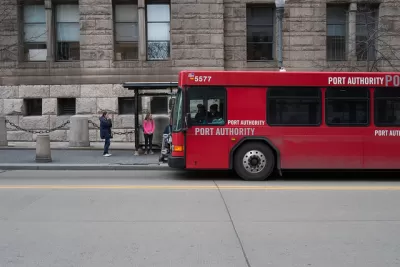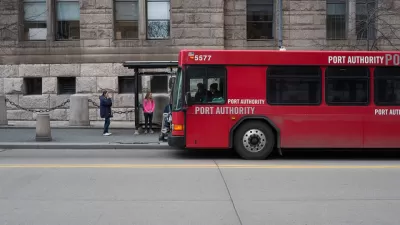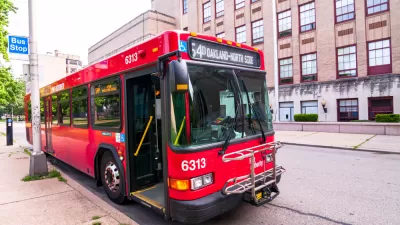The Port Authority of Allegheny County is expected to submit a proposal for a $199.5 million electric bus rapid transit system for federal funding.

"After a second round of public meetings on Port Authority’s proposed Bus Rapid Transit system — and what changes it might have for local service — the agency will spend the next three months refining the project before it is resubmitted for federal funding," reports Ed Blazina from Pittsburgh.
The proposed $195.5 million electric BRT system will connect Downtown and Oakland via dedicated lanes, requiring streets to be completely rebuilt. After years of planning, the proposed project hit snags recently because of political fallout over reduced local bus service in suburban areas along the route as a result of the new line. The question of funding is also undetermined, although the Port Authority has expressed support for the project, with or without federal funding.
Recent meetings addressed in Blazina's article were tailored to responding to concerns about local bus service, and adjusting the plan with those concerns in mind.
FULL STORY: Port Authority moves to final design for Pittsburgh-to-Oakland bus system

Maui's Vacation Rental Debate Turns Ugly
Verbal attacks, misinformation campaigns and fistfights plague a high-stakes debate to convert thousands of vacation rentals into long-term housing.

Planetizen Federal Action Tracker
A weekly monitor of how Trump’s orders and actions are impacting planners and planning in America.

In Urban Planning, AI Prompting Could be the New Design Thinking
Creativity has long been key to great urban design. What if we see AI as our new creative partner?

Pedestrian Deaths Drop, Remain Twice as High as in 2009
Fatalities declined by 4 percent in 2024, but the U.S. is still nowhere close to ‘Vision Zero.’

King County Supportive Housing Program Offers Hope for Unhoused Residents
The county is taking a ‘Housing First’ approach that prioritizes getting people into housing, then offering wraparound supportive services.

Researchers Use AI to Get Clearer Picture of US Housing
Analysts are using artificial intelligence to supercharge their research by allowing them to comb through data faster. Though these AI tools can be error prone, they save time and housing researchers are optimistic about the future.
Urban Design for Planners 1: Software Tools
This six-course series explores essential urban design concepts using open source software and equips planners with the tools they need to participate fully in the urban design process.
Planning for Universal Design
Learn the tools for implementing Universal Design in planning regulations.
planning NEXT
Appalachian Highlands Housing Partners
Mpact (founded as Rail~Volution)
City of Camden Redevelopment Agency
City of Astoria
City of Portland
City of Laramie




























